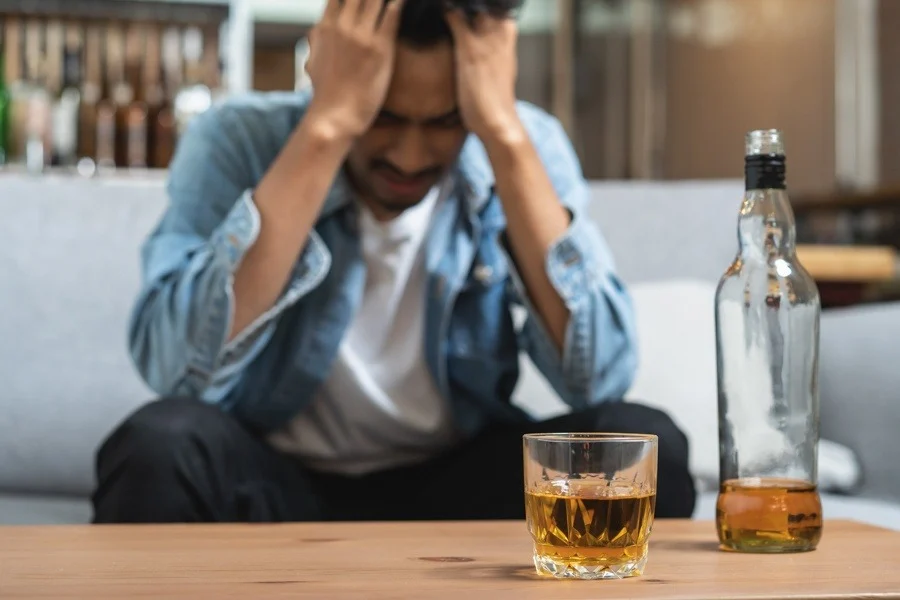If you’ve been prescribed Wellbutrin for depression or to help you quit smoking, you might be wondering: Can you drink on Wellbutrin safely? While the medication is effective, mixing Wellbutrin and alcohol can increase the risk of serious side effects—including seizures—and may undermine your recovery. At Spero Recovery Center, we believe that understanding these interactions is key to making safer choices and supporting long-term progress.
This blog explores the potential dangers of combining Wellbutrin and alcohol, along with practical ways to manage treatment responsibly. If you’re taking this medication, knowing how alcohol affects its effectiveness (and your overall well-being) can make a significant difference in your recovery or mental health journey.
What Is Wellbutrin and How Does It Work?
Wellbutrin, also known as bupropion, is a prescription medication primarily used to treat depression and seasonal affective disorder. It can also be prescribed to help people quit smoking. Unlike many antidepressants, Wellbutrin isn’t an SSRI. Instead, it works by increasing the availability of norepinephrine and dopamine, which can help improve mood, focus, and motivation.
Doctors often prescribe Wellbutrin for people who haven’t responded well to other antidepressants or who experience unpleasant side effects with typical SSRI medications. It’s also a common option for those dealing with both depression and fatigue since it tends to be more energizing than sedating. Some patients taking Wellbutrin report feeling more alert and emotionally stable within a few weeks of starting treatment.
Wellbutrin is not suitable for everyone. It’s typically avoided in individuals with a history of seizures, eating disorders like bulimia or anorexia, or those who are already dealing with heavy alcohol use. Anyone who has questions about using Wellbutrin while also drinking should speak with a medical provider before making any changes since stopping the medication or continuing to drink without guidance can lead to complications.
Can You Drink While On Wellbutrin Without Any Side Effects?
Even a modest drink can lead to surprising reactions when taken alongside Wellbutrin. The medication can lower your tolerance to alcohol, so you might feel the effects after just one or two servings. Things like dizziness or slowed reaction time tend to hit harder. That can make everyday activities like driving feel riskier than usual.
A major concern with Wellbutrin and alcohol is seizures. Wellbutrin on its own increases seizure risk in a dose‑dependent way; alcohol makes that risk climb further. It can happen even for people with no history of seizures. The danger can linger for days, especially if alcohol use fluctuates or stops suddenly. Alcohol is a depressant, while Wellbutrin works to stimulate certain brain pathways. When used together, this opposing effect can cancel out the benefit of the medication and deepen a low mood or create one.
Beyond mental effects, the combination may amplify physical side effects like nausea, vomiting, blurred vision, and confusion. These might seem like small things, but they can be pretty risky. When your coordination and judgment are off, you’re more likely to have accidents, get hurt, or even worse.
What Are The Symptoms Of A Negative Reaction To Wellbutrin And Alcohol?
Below are common warning signs that may appear when Wellbutrin and alcohol are mixed. Keep an eye out and consider seeking medical guidance if you notice any of these:
- Intense dizziness or unsteady movements – Feeling off-balance or overly drowsy after just one or two drinks can signal an interaction.
- Tremors or unusual shaking – Sudden tremors, especially after several drinks, could be a red flag for a seizure risk.
- Nausea, vomiting, or abdominal pain – These symptoms often amplify when alcohol meets Wellbutrin.
- Blurred vision or ringing in the ears – Alcohol may worsen these effects linked to bupropion.
- Confusion, memory lapses, or slurred speech – This could mean your coordination and cognition are being impacted by the mix.
- Heightened anxiety or mood slump – Some users experience anxiety spikes or a return of low mood when drinking on this medication.
- Insomnia or severe restlessness – Trouble sleeping or feeling agitated may increase after alcohol intake.
- Seizure or loss of consciousness – Even brief blackout or seizure events signal danger.
- Chest pain or difficulty breathing – These physical distress signals warrant immediate medical attention.
How Can Wellbutrin Affect Alcohol Tolerance And Cravings?
Many users report feeling intoxicated after just one or two drinks. This drop in alcohol tolerance happens because the medication makes the central nervous system more sensitive, so alcohol’s sedative effects come on more quickly. In practical terms, small amounts of alcohol may lead to dizziness, drowsiness, or feeling off-balance much faster than before.
Wellbutrin affects dopamine and norepinephrine levels in the brain, and these systems play a role in craving cycles. Some studies show that it may reduce alcohol cravings, particularly in people with a dual diagnosis of addiction and depression. This effect seems stronger when Wellbutrin is paired with other treatments like naltrexone.
On the other hand, these shifts can backfire. Lower alcohol tolerance might lead someone to binge more quickly, increasing the risk of adverse effects. And if alcohol was once a coping tool, dampening cravings might destabilize old habits, sometimes causing an unpredictable emotional response. Additionally, alcohol undercuts Wellbutrin’s antidepressant impact, so cravings may mix with mood dips, creating a tricky landscape to navigate.
What Should You Do If You’ve Mixed Wellbutrin And Alcohol?
First, don’t panic. Mild sedation or confusion might pass without serious issues. However, keep a close watch on how you feel for the next 24 hours. Monitor yourself for new or worsening dizziness, tremors, nausea, or mood changes. Let your doctor know about the combination and any symptoms you’re experiencing. This will help them figure out if you need a follow-up or a change in your dosage.
Be alert to more critical signs like shaking that isn’t subsiding, slurred speech, memory lapses, or sudden emotional lows. These symptoms may indicate an increased seizure risk or deeper cognitive impact. If any of these pop up, get medical help right away.
For heavier alcohol exposure, or if you have a history of heavy drinking, your risk remains high over the next few days. Alcohol withdrawal on Wellbutrin can also provoke seizures, tremors, and agitation. Keep in close communication with your healthcare provider throughout this period.
What Are The Alternatives To Wellbutrin For People Who Drink Occasionally?
Always consult a medical provider before switching medications. The alternatives listed here are general examples and may not be appropriate for everyone. Below are some alternative medication strategies for people who enjoy drinking occasionally and are concerned about Wellbutrin and alcohol. These options may offer a safer balance if you want fewer risks with light alcohol use:
- SSRIs (e.g., escitalopram, sertraline, fluoxetine). In general, these medications are better tolerated with a small amount of alcohol. They still carry a risk of increased drowsiness or dizziness, but they are not known to raise seizure risk like Wellbutrin does.
- Mirtazapine (Remeron). An atypical antidepressant that tends to cause sedation rather than stimulation. It can result in drowsiness amplified by alcohol, but it has a low seizure risk, and some find it less disruptive in social drinking contexts.
- Trazodone (Desyrel). Often prescribed at night to help with sleep, trazodone remains sedating. Drinking may intensify that drowsiness, but seizure chances stay lower compared to Wellbutrin.
- Reversible MAOI like moclobemide. Unlike irreversible MAOIs, moclobemide has fewer dietary and alcohol interactions. It doesn’t dramatically raise blood pressure when mixed with alcohol, though it can still cause dizziness or mild sedation.
- Cognitive behavioral therapy or a combined mild antidepressant/therapy approach. Non-medication treatments reduce reliance on pharmacology against the backdrop of occasional drinking. Many people find therapy supports mood without needing to risk medication–alcohol interaction.
Can Wellbutrin Be Used To Treat Alcohol Dependence?
Wellbutrin (bupropion) is not officially approved to treat alcohol use disorder, but some studies have explored its off-label potential. It shares a mechanism with how it manages depression (boosting dopamine and norepinephrine), which could dampen alcohol cravings. One small trial involving people dealing with both depression and heavy drinking found that those taking Wellbutrin reported fewer cravings and less drinking compared to placebo.
In a pilot study of patients recovering from alcohol dependence who also smoked, sustained-release bupropion helped with tobacco cravings and, interestingly, all participants on the medication remained sober during the study period. While that group was small, and the primary aim wasn’t alcohol treatment, it suggests a mood-stabilizing effect that may support early recovery efforts where depression and cravings overlap.
Laboratory research also conducted in animals suggests that when combined with medications like naltrexone, bupropion further reduced alcohol intake, offering a possible future combination therapy, even though bupropion alone didn’t significantly curb drinking in rats.
Spero Recovery Can Help You Quit Smoking—Safely
At Spero Recovery Center, we support individuals who are ready to quit smoking and improve their overall well-being. For some, medications like Wellbutrin can be part of that journey, but it’s important to understand how these medications interact with other habits, like alcohol use. Mixing Wellbutrin and alcohol may reduce the medication’s effectiveness and increase side effects, including the risk of seizures.
Our program goes beyond willpower. We work with you to build healthier routines, identify triggers, and create sustainable strategies tailored to your lifestyle. If you’ve tried to quit before and struggled, our practical, compassionate approach can make all the difference.
Whether you’re quitting smoking, managing depression, or exploring treatment options, Spero is here to help. Our team will walk you through your choices, helping you understand how medications like Wellbutrin fit into your recovery and what steps to take if you drink occasionally or socially.
If you’re unsure whether you can drink on Wellbutrin or want guidance on quitting smoking or managing your mental health, contact us today. We’re here to support your recovery every step of the way.



















